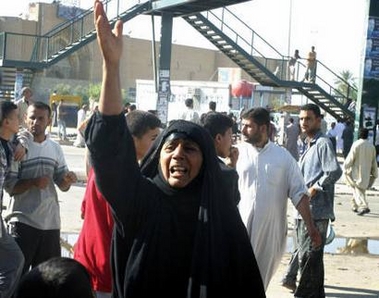Nearly 6,000 civilians were slain across Iraq in May and June, a spike in
deaths that coincided with rising sectarian attacks across the country, the
United Nations said Tuesday.

An Iraqi woman
gestures at the site of an explosion in Kufa July 18, 2006. A suicide
bomber pulled his minivan into a busy market on Tuesday, lured labourers
onboard with the promise of jobs and then blew himself up, killing at
least 59 people in one the bloodiest attacks in Iraq this year.
[Reuters] |
The report from the U.N. Assistance Mission in Iraq describes a wave of
lawlessness and crime, including assassinations, bombings, kidnappings, torture
and intimidation.
Hundreds of teachers, judges, religious leaders and doctors have been
targeted for death, and thousands of people have fled, the report said. Evidence
suggests militants also have begun to target homosexuals, it said.
"While welcoming recent positive steps by the government to promote national
reconciliation, the report raises alarm at the growing number of casualties
among the civilian population killed or wounded during indiscriminate or
targeted attacks by terrorists or insurgents," the U.N. said in a note
accompanying the report.
In the last two days alone, more than 120 people were killed in violence in
Iraq. In the worst attacks, fifty-three perished in a suicide bombing Tuesday in
Kufa, and 50 were slain Monday in a market in Mahmoudiya.
According to the report, 2,669 civilians were killed in May and 3,149 were
killed in June. Those numbers combined two counts: from the Ministry of Health,
which records deaths reported by hospitals; and the Medico-Legal Institute in
Baghdad, which tallies the unidentified bodies it receives.
The report charts a month-by-month increase in the number of civilians
killed, from 710 in January to 1,129 in April. In the first six months of the
year, it said 14,338 people had been killed.
The report's figures were higher than some other counts, but even the U.N.
said many killings go unreported.
According to an Associated Press tally based on its daily reporting, at least
1,511 civilians were killed, in May and June, with at least an additional 289
police and security forces killed.
The AP tally showed that from January through June 2006, at least 4,191
civilians were killed. The minimum number of police and security forces
casualties in that period was at least 805 killed. The AP figures do not include
insurgents.
It was unclear whether the tally from the Medico-Legal Institute included
only those who were killed as a result of violence.
The spike in casualties comes despite the formation of a unity government,
which took power on May 20. U.S. officials had hoped it would make good on
promises to disband Shiite militants and bring Sunni insurgents into the fold.
Yet, as the report said, parts of Iraq have seen "collusion between criminal
gangs, militias and sectarian 'hit groups,' alleged death squads, vigilante
groups and religious extremists."
It also details the rise in kidnappings, particularly of large groups of
people. On May 17, for example, the report said 15 Tae Kwon Do athletes were
kidnapped in western Iraq.
"There is no news regarding their whereabouts," the report said.
Women report that their rights have been rolled back by extremist Muslim
groups, both Shiite and Sunni. While under Saddam Hussein's largely secular
regime, women faced few social restrictions, they say they are now barred from
going to market alone, wearing pants or driving cars.
And children are frequently victims, perishing in large crowds or sometimes
even targeted themselves, the report said.
"Violence, corruption, inefficiency of state organs to exert control over
security, establish the rule of law and protect individual and collective rights
all lead to inability of both the state and the family to meet the needs of
children," it said.
The government still has not pursued many allegations of torture and other
inhumane treatment in prisons and detention centers, the U.N.
said.